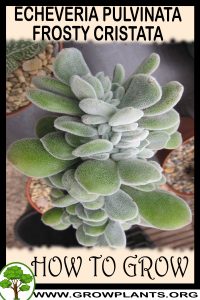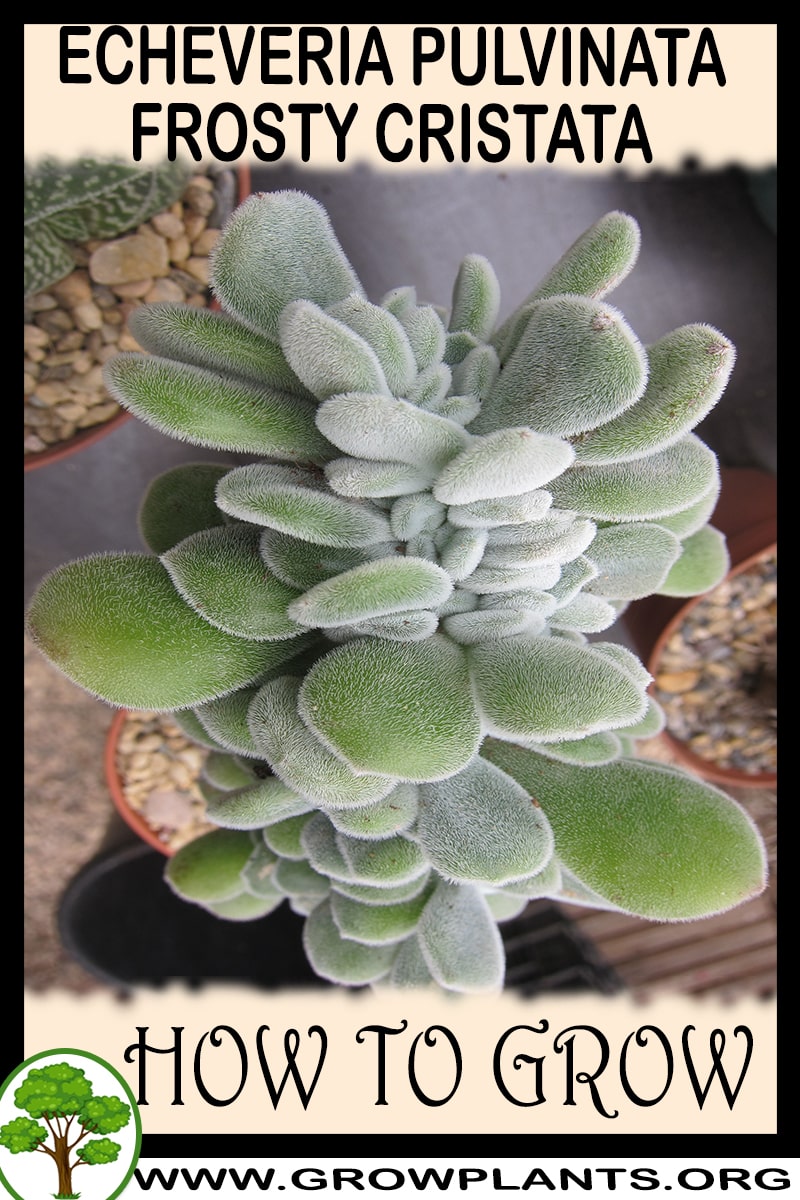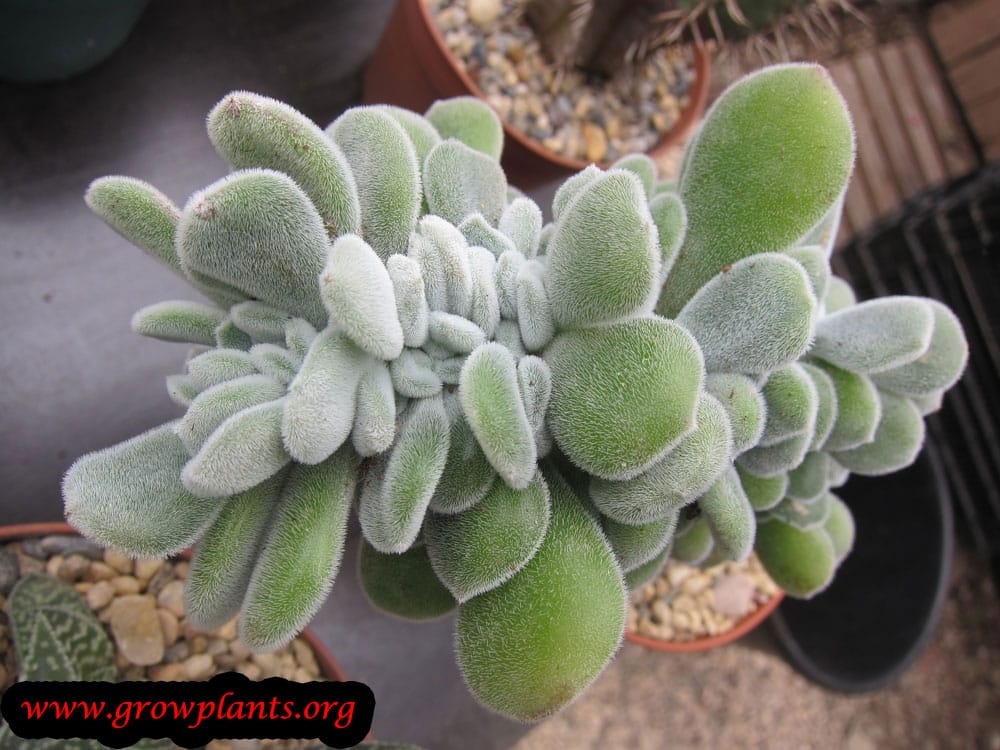
Echeveria pulvinata Frosty cristata grow and care – subshrub succulent of the genus Echeveria also known as Echeveria Frosty cristata, Echeveria pulvinata Frosty cristata perennial evergreen used as ornamental drought tolerant plant or bonsai, can grow in mediterranean, subtropics, dry tropic climate or as houseplant and growing in hardiness zone 10+ and with the right care in hardiness zone 9b+.
Echeveria pulvinata Frosty cristata leaves and flowers
Leaves color green gray can be in red with hair in egg shape leaves fleshy in velvet.
Stem color green gray grow in shape of fasciation (cristation) wavy to shapeless structure.
Flower color orange-red, the flowers bell shape with five petals and grow in the top of the plant.
Echeveria pulvinata Frosty cristata for sale – Seeds or Plants to Buy
No products found.
How to grow Echeveria pulvinata Frosty cristata growing and care:
Well-drained soil, sandy soil, better more than 7C but can grow in frost
How to care:
Cut once a year and consider to put fertilizer once a year, location with a lot of rain better to plant them in raising bed in order to prevent puddle in the roots
What is the best way to start growing?
Plant / Seed / Vegetative reproduction – cutting leaves or stem, leaf it’s the easier and both stem and leaves do in the same way, cut the leaves, cut in the base of the leaf with hand not anything sharp and wait at least 24 hours but better when the tissue heal, if it’s not cut in the base or it is stem need wait few days until the tissue will hill after this, put it in well-drained soil, and water it every few days let in dry but not fully dry, after few weeks to month it start to grow root, cutting better to start in the late spring to early summer but always can do it indoor
Is it necessary to use vegetative reproduction?
No, but easier to start from cutting stem or leaves, when grow from seeds not possible to ensure what kind of plant will be and also it’s very slowly
Difficulties or problems when growing:
Sensitive to overwater
Recommended planting season?
Spring in hardiness zone 9b, spring to summer in hardiness zone 10a, spring to autumn in hardiness zone 10b-11a, all year in hardiness zone 11b+
How to plant:
Planting in location with good drainage, the plant doesn’t like and might die if will sit in puddle so in rainy location better to grow above the ground level and use raising bad, better to dig bigger hole and put in the soil well ventilated soil, better to plant it in sandy soil.
Pests and diseases:
Snails, slugs, aphids, meal bug
Pruning season:
All year, for design in winter
How to prune:
Just for design dead leaves and bloom stem, if have infected leaves if it’s not possible to clean better to cut them out
Size of the plant:
15-30cm, 6-12 inches
Growth speed in optimal condition:
Slow growing and especially when the plant is young
Water requirement:
Small amount of water and good drainage, overwater might kill the plant
Light conditions in optimal condition for growing:
Full Sun – in hot summer areas the leaves might burn, but in winter in hardiness zone of 9b-10a / Half Shade – in hot climate better / Full Shade (with light)
Is it possible to grow indoor as houseplant?
Yes, it’s not hard to grow indoor but if the plant start to look bad increase the light
Growing is also possible in a planter /flowerpot / containers:
Yes, when growing in containers need to choose container that 15% to 30 % bigger than the roots ball, also the drainage of the soil it’s important, but after few years drainage of the soil not function the same so need to change it to new soil
Growing is also possible in pots, planter, flowerpot or containers:
Yes, when growing in containers need to choose container that 50-80% bigger than the roots ball or possible to grow it in smaller pots but need to cut the roots when planting, also the drainage of the soil it’s important, but after few years drainage of the soil not function the same so need to change it to new soil possible to switch just part of the soil, possible to use potting mix or cactus potting mix, better to put little stone little rocks like: gravel, lava rocks or pebbles it will take care of the drainage and do not use bottom for the pot.
Blooming information
Bloom season:
Winter / Spring – usually in the spring but in hotter climate will be in winter
General information about the flower
Orange-red small flowers in bell shape and grow in clusters in the top of the plant
How to grow Echeveria pulvinata Frosty cristata from seeds
Sowing requirement:
Location with light and better sandy or well ventilated soil and good drainage soil, keep soil slightly moist, sow in light doesn’t have to be sunny, temperature 23-27C (73-80F)
Saving seeds and care until sowing:
Dry and dark place in room temperature
Sowing season:
Spring after the last frost in hardiness zone 10a, spring to summer in hardiness zone 10b, spring to autumn in hardiness zone 11 and possible all year in hardiness zone 12
How to plant:
Need to plant in light soil, with good drainage overwater will cause problem in germination
Planting spacing:
For transplant 5*5cm (2*2 inch)
Depth of Sowing:
0.5cm (0.25inches)
Conditions for seeds germinate:
Moist soil but do not over water and don’t let it dry
Watering requires for Seeds:
Small amount of water / Average amount of water
Germination time:
3-6 weeks
Condition of seedling:
Light with moist soil and well ventilated soil
Scientific name:
Echeveria pulvinata ‘Frosty cristata’
Categories
| Blooming Seasons |
|
|---|---|
| Flower colors |
|
| Climate |
|
| Leaf color |
|
| Ornamental parts |
|
| Plant growing speed |
|
| Plant life-form |
|
| Plant Uses |
|
| Planting Season |
|
| Plants sun exposure |
|
| Watering plants |
|
| Hardiness zone |
|


